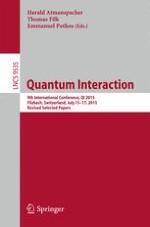2016 | OriginalPaper | Buchkapitel
A Compositional Explanation of the ‘Pet Fish’ Phenomenon
verfasst von : Bob Coecke, Martha Lewis
Erschienen in: Quantum Interaction
Aktivieren Sie unsere intelligente Suche, um passende Fachinhalte oder Patente zu finden.
Wählen Sie Textabschnitte aus um mit Künstlicher Intelligenz passenden Patente zu finden. powered by
Markieren Sie Textabschnitte, um KI-gestützt weitere passende Inhalte zu finden. powered by
